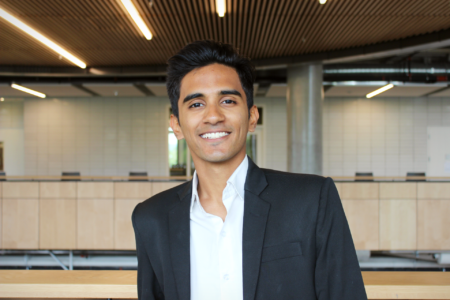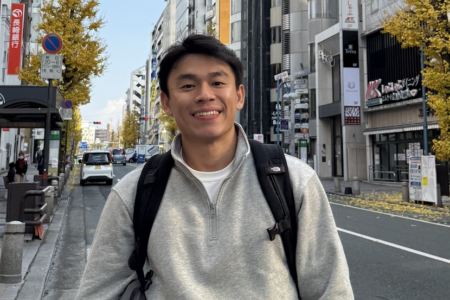
If there’s one thing every international student needs to do before moving to a new country, it’s this: learning the local language.
“Learning the language of the country you’re in is not only to interact with others; it’s a way for you to build confidence to speak to a local and live life in the country you’re in,” says Jang Ji Woong, founder of the Korean language learning app TEUIDA.
Coming from someone who was once an international student himself, it’s safe to say Jang knows what he’s talking about.

Jang is a political science graduate from the University of California, Berkeley. Source: Jang Ji Woong
‘Learn a new language is through exposure and interaction’
Born and raised in South Korea, Jang’s exposure to different languages was limited. It was only during his time in the country’s mandatory military service for men that he realised learning a new language — specifically English — was the way to chase his dreams.
Jang’s time participating in the military service was marked by the many books about missionary work he read. Being a Christian himself, it sparked an interest in him.
“I wanted to participate in missionary work after leaving the military, but because of the challenges they face, I was a little hesitant,” he shares.
“After more research, I noticed that the United Nations (UN) plays a role in the missionaries, so I decided to work for the UN or any international organisation to help people or societies in need.”
But to work for the UN or any international humanitarian organisation, Jang needed a degree in political science, and one taught in English.
Upon completing his military service, he moved to the US to pursue a BA in Political Science at Santa Barbara City College (SBCC). After two years at SBCC, he transferred to the University of California, Berkeley, to complete the final year of his degree.
View this post on Instagram
Jang’s time abroad — in the US, no less — meant learning English happened on a daily. Still, it was no easy feat.
Learning a new or second language at an older age is considered more complex than learning it as a child. A study from MIT reports that children remain very skilled at learning the grammar of a new language until the age of 17 or 18, but it’s nearly impossible to achieve proficiency similar to that of a native speaker unless they start learning it by age 10.
Learning a new language is not solely determined by age but also by other factors, such as exposure to the language, motivation, and individual learning style, according to a 2024 study.
Jang’s story proves that the best way to learn a language is by actually living it.
“To improve your language skills, you’ll need to spend a significant amount of time studying abroad. At UC Berkeley, I was always behind on discussions in English, but thanks to the support I got at the university, I could get help,” he says. ”
“My English was not perfect, but my classmates were patient. I even had help from tutors to help me rephrase my sentences, which led me to build up my confidence in my English speaking skills.”

TEUIDA turned six years old in February 2025. Source: Jang Ji Woong
TEUIDA, the one-of-a-kind Korean language learning app
From January to June 2024, South Korea hit a record-breaking number of 204,000 international students, the Korea Tourism Data Lab reports.
International student enrolment in Japan is also rising, at 279,274 in 2023, 20.8% from the previous year, according to the Japan Student Services Organisation.
In fact, there’s a growing number of students from abroad enrolling into universities in non-English speaking countries, particularly in regions like Asia and Europe.
If you were to ask Reddit or Quora if you need to learn the local language before moving to either of those countries, they’ll most probably say you don’t.
But in reality, it’s always best to learn the language before moving. You may learn it from YouTube, language learning apps, or even textbooks, but to Jang, nothing beats verbal interactions.
View this post on Instagram
“When I was looking at language learning apps, I noticed the way they’re teaching people is through vocabulary or by making learners practice sentence forming, but they do not help them with their speaking skills,” he says.
“And looking back to my time in the US, I acknowledge that conversing with native speakers is key to improving one’s speaking skills.”
With that, Jang founded TEUIDA, a one-of-a-kind Korean language learning app that helps learners learn the language while providing “experiences in talking with native speakers in everyday life.”
As a language isolate — meaning it has no known close relatives — Korean has unique linguistic characteristics and complex grammar rules, making learning difficult, especially for English speakers.
90 Day Korea writes, “If you’re studying the Korean language, then you’ll need to have your Korean grammar down.”
Sherry Osborne, a Canadian YouTuber and honorary reporter for the Korea.net believes that learning Korean grammar first before its vocabulary is important as it can help make your sentences complete.
This is where TEUIDA comes in handy.
TEUIDA is an app that offers first-person virtual conversations, allowing users to express their everyday thoughts in real-life scenarios.
The app’s speech recognition system enables users to practise speaking and receive feedback on their pronunciation.
When using the app, you’ll get to pick the language you’re interested in learning and choose a lesson that aligns with your goals. The app will walk you through your first lesson and set a foundation for you.
The next step is when the speech recognition system comes into play. You’ll participate in interactive learning with TEUIDA’s in-app tutor and be asked to repeat words and phrases. The tutor then gives you immediate feedback on your pronunciation.
Today, TEUIDA has over two million users and offers two new languages, Spanish and Japanese.










